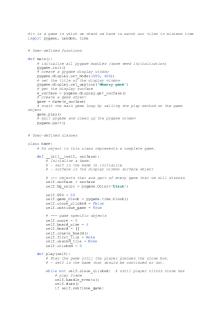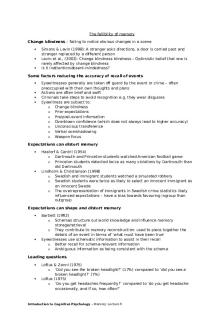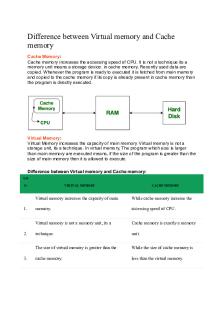Memory - Eric Lundquist PDF

| Title | Memory - Eric Lundquist |
|---|---|
| Course | General Psychology I |
| Institution | University of Connecticut |
| Pages | 5 |
| File Size | 207.4 KB |
| File Type | |
| Total Downloads | 33 |
| Total Views | 128 |
Summary
Eric Lundquist...
Description
Human Memory ● Information is encoded to memory, stored, then retrieved ● Stage theory: long-term and short-term “working” memory ● Duration ○ Long-term memory: relatively permanent ○ Short term memory: seconds to minutes ● Storage capacity ○ Long term memory: infinite? ■ Typically don’t remember first two years ● Hippocampus not fully formed ● Don’t know language ● Don’t have strategies for remembering ○ Short term memory: 7+/-2 “chunks“ (organized packets of information) ■ Chunking uses information from LTM ● Flow of information in memory:
○
●
●
Stimulus - STM - rehearsal - LTM ■ Two kinds of rehearsal: ● Maintenance - holds info in STM ○ Repetition ● Elaborative - moves info to LTM ○ Making a home for new information - thinking hard - notice relationships Serial position effect in free recall ○ Task: read 20 words one at a time, recall in any order ○ Primacy effect - early part of list recalled better than middle ■ Recalled from LTM ○ Recency effect - last part of list recalled better than middle ■ Recalled from STM ○ Reduce recency: delay between 20th word and recall ○ Reduce primacy: present words faster Further differences between STM & LTM ○ Psychological code
■
●
●
●
STM: phonological ● Based on speech sounds ○ coat vs boat ■ LTM: semantic ● Based on meaning ○ boat vs ship ○ Neural code ■ STM: dynamic ● Pattern of activity among a group of cells ■ LTM: structural ● Pattern of connections within a group of cells ■ “Trace consolidation“ is what goes on during elaborative rehearsal - a memory trace changes from a dynamic to a structural pattern ● Amnesia - interruption of consolidation process at the neural level (concussion…) ○ Retrograde amnesia for events before trauma ○ Anterograde amnesia for events after trauma ○ Forgetting ■ STM: displacement and/or decay ● STM has capacity limitations unlike LTM ■ LTM: misplacement and/or retrieval failure ● Proactive interference: old info affects new ● Retroactive interference: new info affects old Working memory: ○ STM is not just a storage box ■ More like a cognitive workbench ○ Limit on storage capacity is viewed instead as limit on processing capacity ○ Used in all processing of information ■ Mental calculation, reading, etc. Depth of processing: ○ What kind of encoding will be most successful? ■ Deeper (more meaningful) processing leads to better memory ○ Connected to notion of elaborative rehearsal ○ Craik and Tulving (1975) experiment ■ It was easiest to encode words into memory when asked semantic questions ● Then acoustic, then visual Kinds of memory:
○
LTM vs STM (working memory)
○
Episodic: episodes, events with time and place ■ “I saw an elephant at the zoo in 2008” ■ Most information is initially stored in episodic memory Generic/semantic: facts, concepts and meanings ■ “An elephant has big floppy ears and a trunk”
○
○
○
○ ○
Explicit: reference to prior learning experience ■ Recall - “What were the words on the list you read?” ■ Recognition - “Circle the words you saw earlier” Implicit: no conscious awareness of remembering ■ Priming - read list of words then do tasks ● Identity priming - flash a word beforehand to prepare memory ● Semantic priming - flash a different word before hand to prepare the brain for that category of words ● Repetition priming - you are more likely to identify words that you saw earlier ○ Stem completion - “MOT___” ○ Word fragment completion - “_U_P_” ● Priming is long-lasting Declarative: knowing that (mainly explicit) ■ Statements, using episodic and generic information Procedural: knowing how (mainly implicit) ■ Skills (riding a bike, playing an instrument, etc.)
●
○ ○ ○
Hippocampus and amygdala Korsakoff’s arises from alcoholism - anterograde amnesia H.M. - Henry Molaison ■ William Scoville developed operation to remove the hippocampus and amygdala ● Molaison couldn’t make any new memories ● Had less and less seizures ■ HM still had procedural learning ■ Lost the ability to make new explicit memories
○
Retention without awareness ■ Amnesic patients and normal controls tested for memory of words learned previously ■ Amnesics performed poorly on explicit memory tasks ■ Performance on implicit memory tasks was like control subjects
Retrieval: ○ Encoding specificity principle (or compatibility principle): ■ Retrieval cue – current stimulus that aids retrieval ■ Any memory for an item has the item’s context wrapped up in it too ■ Context (cues) at retrieval should be as much as possible like context at encoding ■ Ex: learn list - “figure, data, diagram, table, chart, graph…” ● Then “furniture” would not be a good retrieval cue for table ■ Ex: learn list - “Honda, Ford, Toyota, Saturn, Lexus…” ● Then “rings” would not be a good retrieval cue for Saturn ○ Context-dependent memory: ■ Scuba divers learned words either on land or underwater ■ Tested for a recall on land or underwater ■ Recall was better in context where words had been learned ○ Is retrieving a memory like playing back a tape? - Loftus and Palmer (1974) ■ View slides of car accident ■ Ask “how fast were the cars going when they hit each other?” OR “how
fast were the cars going when they smashed into each other?” One week later: “did you see any broken glass in the pictures?” ● YES response more likely for “smash” group ■ CONCLUSION - at least in part, memory involves reconstruction of remembered information ● Memory may be distorted by other information Generic/semantic memory: ■ Retrieval = search through network of concepts ■ Organized according to semantic relatedness (closeness of meaning) ■ Activation of one concept spreads to other related concepts ■ “What does rosebud mean?”, “Do chickens have lips?”, “How many arms did Aristotle have?”, “How many years did Vincent van Gogh have?” ■
○...
Similar Free PDFs

Memory - Eric Lundquist
- 5 Pages

Memory
- 3 Pages

Memory
- 5 Pages

Virtual Memory
- 58 Pages

CACHE MEMORY
- 1 Pages

Memory Psych
- 1 Pages

Virtual Memory
- 17 Pages

Memory notespack
- 16 Pages

Memory Management
- 5 Pages

9.) Memory
- 4 Pages

Nondeclarative Memory
- 3 Pages

10.11.17 - Notes - Eric Berne
- 2 Pages
Popular Institutions
- Tinajero National High School - Annex
- Politeknik Caltex Riau
- Yokohama City University
- SGT University
- University of Al-Qadisiyah
- Divine Word College of Vigan
- Techniek College Rotterdam
- Universidade de Santiago
- Universiti Teknologi MARA Cawangan Johor Kampus Pasir Gudang
- Poltekkes Kemenkes Yogyakarta
- Baguio City National High School
- Colegio san marcos
- preparatoria uno
- Centro de Bachillerato Tecnológico Industrial y de Servicios No. 107
- Dalian Maritime University
- Quang Trung Secondary School
- Colegio Tecnológico en Informática
- Corporación Regional de Educación Superior
- Grupo CEDVA
- Dar Al Uloom University
- Centro de Estudios Preuniversitarios de la Universidad Nacional de Ingeniería
- 上智大学
- Aakash International School, Nuna Majara
- San Felipe Neri Catholic School
- Kang Chiao International School - New Taipei City
- Misamis Occidental National High School
- Institución Educativa Escuela Normal Juan Ladrilleros
- Kolehiyo ng Pantukan
- Batanes State College
- Instituto Continental
- Sekolah Menengah Kejuruan Kesehatan Kaltara (Tarakan)
- Colegio de La Inmaculada Concepcion - Cebu



